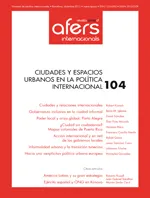Informational citizenship: inclusive governance in the informal city

The informal city, as a conurbation of informal human settlements, is in practice the opposite model to the formal city. By taking an objective view of a global urban reality polarised into urban informal metro-conurbations, multilateral and international development agencies continue to insist on channelling much of their resources into a social context that has converted their political invisibility, financial self-sufficiency and environmental resilience into the Achilles’ heel of local governments, weighed down by endless administrative and fiscal decentralisation processes. Who are governmental actions being implemented for? How and with whom should local governance be shared? These are crucial questions which, prior to any prioritisation of urban strategy public policy, will continue to create tension for the governing bodies in their daily management of the emerging city.
Key words: informal city, governance, local government, ICT, citizenship
The full text articles of this issue are available only in Spanish language